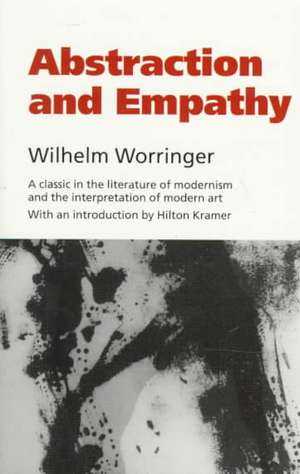Abstraction and Empathy
Autor Wilhelm Worringer Traducere de Michael Bullocken Limba Engleză Paperback – oct 1997
Preț: 115.23 lei
Nou
Puncte Express: 173
Preț estimativ în valută:
22.06€ • 23.97$ • 18.54£
22.06€ • 23.97$ • 18.54£
Carte disponibilă
Livrare economică 31 martie-14 aprilie
Livrare express 15-21 martie pentru 16.32 lei
Preluare comenzi: 021 569.72.76
Specificații
ISBN-13: 9781566631778
ISBN-10: 1566631777
Pagini: 168
Dimensiuni: 128 x 204 x 13 mm
Greutate: 0.15 kg
Ediția:Elephant Pbk.
Editura: Rowman & Littlefield
ISBN-10: 1566631777
Pagini: 168
Dimensiuni: 128 x 204 x 13 mm
Greutate: 0.15 kg
Ediția:Elephant Pbk.
Editura: Rowman & Littlefield
Notă biografică
Descriere
Worringer's classic study argues that in historical periods of anxiety and uncertainty, man seeks to abstract objects from their unpredictable state and transform them into absolute, transcendental forms. With an introduction by Hilton Kramer.

![When China Rules The World: The Rise of the Middle Kingdom and the End of the Western World [Greatly updated and expanded]](https://i4.books-express.ro/bt/9780140276046/when-china-rules-the-world.jpg)








